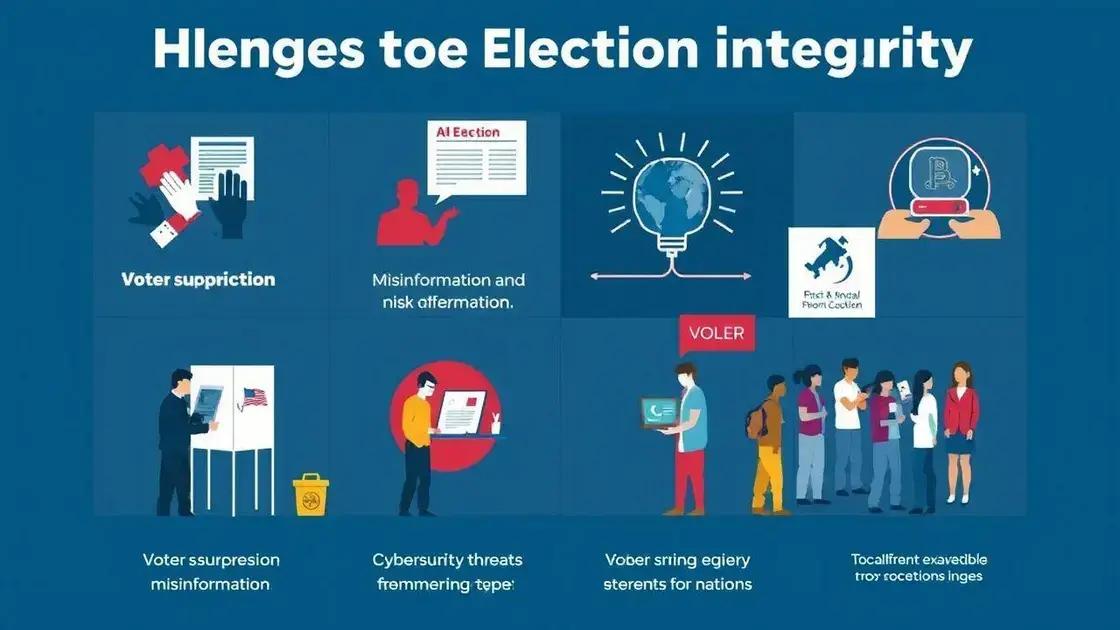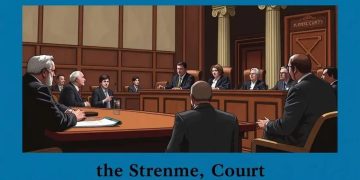Election integrity concerns: what you need to know

Anúncios
Election integrity concerns focus on ensuring that electoral processes are fair, transparent, and free from fraud by using technology, promoting voter education, and enhancing cybersecurity measures.
Election integrity concerns are increasingly in the spotlight as we approach critical voting periods. Many people wonder how these issues affect their ability to vote freely and fairly. In this article, we’ll delve into the complexities surrounding election integrity and why it matters to every voter.
Anúncios
Understanding election integrity
Understanding election integrity is essential for a healthy democracy. It refers to the assurance that elections are conducted fairly, transparently, and without fraud. There are many facets to this topic that need to be explored.
Importance of Election Integrity
Election integrity ensures that every vote counts and that the electoral process is trustworthy. When citizens believe in the system, they are more likely to participate in elections.
Anúncios
- Promotes public confidence in democracy.
- Encourages voter participation.
- Reduces the risk of fraud.
Achieving integrity involves several critical aspects. These include proper voter registration, secure voting methods, and transparent procedures. Each plays a significant role in upholding the integrity of elections.
Factors Affecting Election Integrity
There are various factors that can threaten election integrity. Among them are misinformation and manipulation of voter lists. These can lead to confusion and mistrust among voters.
- Misinformation campaigns can sway public opinion.
- Voter suppression tactics decrease participation.
- Technological vulnerabilities can be exploited.
As we navigate the complexities of this issue, it’s critical to recognize that safeguarding election integrity is a shared responsibility. Policymakers, election officials, and the public must work together to support a robust electoral process.
As we delve deeper into these challenges, it becomes clear that a proactive approach is necessary to enhance and protect electoral integrity. By staying informed and engaged, citizens can ensure that their voices are heard in every election.
Key challenges to electoral integrity

Key challenges to electoral integrity can undermine the trust and confidence that voters have in the democratic process. By understanding these challenges, we can better address and protect the integrity of elections.
Voter Suppression
One significant challenge is voter suppression. Tactics that prevent individuals from voting can take many forms, such as stricter ID laws or limited polling places. These actions can disproportionately affect marginalized communities.
- Strict voter ID requirements create barriers.
- Limited access to polling locations can discourage voting.
- Voter roll purges often remove eligible voters.
Each of these tactics can lead to a decrease in voter turnout, contributing to a less representative democracy.
Disinformation Campaigns
Another pressing challenge is the spread of disinformation. False information about the voting process can mislead and confuse the electorate. This can take place through social media or misleading advertisements.
- Fake news stories can create confusion about voting dates.
- Misinformation about mail-in ballots may discourage participation.
- Rumors can cause fear around the voting process.
As misinformation spreads, it creates a landscape of doubt and skepticism regarding the electoral system.
Cybersecurity Threats
Cybersecurity threats are also a growing concern. The threat of hacking can jeopardize the security of voter information and the voting process itself. Election systems must be fortified against potential cyberattacks to maintain public confidence.
- Inadequate security measures may leave systems vulnerable.
- Foreign interference can exploit weaknesses.
- Data breaches can expose sensitive voter information.
To combat this, election officials must prioritize cybersecurity strategies and robust protections for their systems.
Understanding these key challenges to electoral integrity helps us realize the importance of safeguarding the democratic process. By addressing these issues, we can work to ensure every vote counts and maintains the integrity of our elections.
Case studies on election fraud
Exploring case studies on election fraud helps us understand the complexities and nuances surrounding this serious issue. Examining real-life examples highlights the various types of fraud and their impacts on election outcomes.
The 2000 U.S. Presidential Election
The 2000 U.S. Presidential Election is a significant case study often cited in discussions about election fraud. The controversy arose from the voting process in Florida, where thousands of ballots were discarded. This led to questions about the fairness and integrity of the election. The Supreme Court ultimately decided the outcome, but many still debate the legitimacy of that election.
Alabama’s 2021 Elections
In 2021, allegations surfaced during local elections in Alabama where voters claimed they received unsolicited mail-in ballots. This led to concerns about the potential for manipulation and coercion. Officials investigated the claims, raising awareness about how mail-in voting must be secured better to prevent election fraud.
- Mail-in ballots can be vulnerable to misuse.
- Lack of security measures may lead to fraud.
- Community engagement is essential for transparency.
Instances like these show that vigilance is crucial to ensure trust in elections.
The 2020 U.S. Presidential Election
The 2020 U.S. Presidential Election also faced numerous claims of election fraud. Many accusations arose regarding mail-in voting and ballot counting procedures. Despite investigations, no substantial evidence was found to support widespread fraud. This case highlights the importance of clear communication and transparency in addressing allegations to maintain public trust.
By analyzing these case studies, we can better understand the implications of election fraud claims and the importance of developing robust electoral systems. Each example demonstrates the need for transparency, security, and public engagement in maintaining the integrity of our democratic processes.
The role of technology in elections

The role of technology in elections has grown tremendously in recent years. From online voter registration to the use of electronic voting machines, technology is reshaping how elections are conducted, making them more efficient and accessible.
Impact of Electronic Voting Machines
Electronic voting machines offer several advantages over traditional paper ballots. They can speed up the voting process and make it easier to count votes accurately. However, their use also raises concerns about security and reliability.
- Faster vote counting ensures quicker results.
- Accessibility features assist voters with disabilities.
- Possible technical malfunctions can disrupt the process.
To address these concerns, many states are implementing robust security measures to protect the integrity of these machines.
Online Voter Registration
Another significant advancement is the introduction of online voter registration. This allows citizens to register or update their voter information conveniently from their computers or smartphones. Online platforms can make the voter registration process much more accessible, especially for younger voters.
- Increased convenience encourages more people to register.
- Reduces the likelihood of errors in voter data.
- Streamlines the registration process for election officials.
However, not all regions have adopted online registration, highlighting the digital divide that still exists.
Social Media and Voter Engagement
Technology in elections also plays a vital role in voter engagement. Social media platforms are being used to inform and mobilize voters. Candidates and organizations can share information quickly and reach a broader audience.
- Social media can help spread awareness of voting rights.
- Candidates can engage directly with voters through posts.
- Potential for misinformation can mislead the public.
While this democratizes information, it also requires vigilance to ensure the information shared is accurate and reliable.
Overall, embracing technology in elections enhances both the voting experience and the overall integrity of the electoral process. As technology continues to evolve, it will be vital for election officials to adapt and implement strategies that foster trust and security in the voting system.
Voter education and awareness
Voter education and awareness play vital roles in promoting election integrity and encouraging participation in the democratic process. Educating voters about their rights and the election process can empower them to make informed choices.
Importance of Voter Education
When voters understand how to participate in elections, they are more likely to engage. This includes knowing how to register, cast their votes, and understand the voting methods available. Education ensures that every citizen can exercise their right to vote confidently.
- Informed voters can make better choices.
- Education reduces misinformation about the voting process.
- Awareness campaigns can increase voter turnout.
Creating a well-informed electorate strengthens democracy and enhances election integrity.
Effective Voter Awareness Campaigns
Successful voter awareness campaigns utilize various platforms to reach different demographics. Social media, community workshops, and informational websites can disseminate crucial information about upcoming elections.
- Social media can engage younger voters effectively.
- Community workshops can provide hands-on support for new voters.
- Informational websites can offer up-to-date election details.
Utilizing multiple channels ensures information reaches citizens where they are most active.
Challenges in Voter Education
Despite the importance of voter education, challenges remain. Misinformation can spread rapidly, causing confusion and distrust among voters. Many citizens may also lack access to reliable information, especially in marginalized communities.
- Online misinformation can mislead potential voters.
- Lack of resources in certain areas limits education efforts.
- Language barriers may prevent effective communication.
To overcome these challenges, it is essential to collaborate with trusted organizations to disseminate accurate information.
In conclusion, ongoing voter education and awareness efforts are crucial to ensuring that democracy flourishes. By empowering citizens with knowledge, we can cultivate a more engaged electorate that understands the voting process and their role within it.
Future prospects for secure elections

The future prospects for secure elections are crucial for maintaining the integrity of democracies worldwide. As technology evolves, so do the methods of ensuring that elections are fair, transparent, and secure.
Advancements in Voting Technology
New technologies are making it easier to secure elections. Innovations such as biometric voting systems and blockchain technology offer ways to enhance security. These advancements can help prevent tampering and ensure that every vote is counted accurately.
- Biometric systems use fingerprints or facial recognition to verify voter identity.
- Blockchain can provide a transparent and tamper-proof record of votes.
- Advanced encryption methods can protect voter data from cyber threats.
As these technologies become more widely adopted, the risk of election fraud may decrease, boosting public confidence in electoral processes.
Strengthening Cybersecurity Measures
With the increasing reliance on technology, enhancing cybersecurity is critical. Election officials must implement stronger security protocols to protect against potential hacks and cyber threats. Regular testing and updating of voting systems will be necessary to safeguard against new vulnerabilities.
- Regular security assessments can identify weaknesses in systems.
- Training for election staff on cybersecurity best practices is essential.
- Collaboration with cybersecurity experts can provide additional support.
Improving these measures will be imperative to maintaining election security and public trust.
Public Engagement and Education
Engaging the public in discussions about the future of secure elections plays an essential role in shaping policies. Educating voters about the importance of security measures can lead to greater trust and participation in the electoral process. Awareness campaigns can inform the public of their rights and how to participate in safeguarding elections.
By focusing on these areas, the future of secure elections can be promising. Continuous efforts to integrate new technologies, strengthen security measures, and foster public engagement will create a more robust electoral process.
FAQ – Frequently Asked Questions About Election Integrity and Security
What are the key technologies improving election security?
Key technologies include electronic voting machines, biometric verification, and blockchain for secure vote recording.
How can voter education enhance election integrity?
Educating voters ensures they understand their rights and the voting process, which leads to informed and confident participation.
What role does cybersecurity play in elections?
Cybersecurity protects voting systems from hacking and fraud, ensuring the integrity and confidentiality of the electoral process.
What are some common challenges to maintaining secure elections?
Common challenges include misinformation, voter suppression tactics, and technological vulnerabilities that can undermine public trust.






